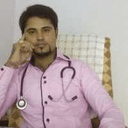Get the App
For Doctors
Login/Sign-up
Last Updated: Sep 21, 2020
BookMark
Report
A pimple, zit or spot is a kind of comedo and one of the many results of excess oil getting trapped in the pores. Some of the varieties are pustules or papules.Pimples can be treated by various acne medications prescribed by a physician, or purchased at a pharmacy with a wide variety of treatments
CAUSES:
Inside the pore are sebaceous glands which produce sebum. When the outer layers of skin shed (as they do continuously), the dead skin cells left behind may become 'glued' together by the sebum. This causes the blockage in the pore, especially when the skin becomes thicker at puberty. The sebaceous glands produce more sebum which builds up behind the blockage, and this sebum harbours various bacteria including the species Propionibacterium acnes, causing infection and inflammation
TREATMENT :
Common over-the-counter medications for pimples are benzoyl peroxide and/or salicylic acid and antibacterial agents such as triclosan. Both medications can be found in many creams and gels used to treat acne (acne vulgaris) through topical application. Both medications help skin slough off more easily, which helps to remove bacteria faster. Before applying them the patient needs to wash his or her face with warm water and dry. A cleanser may also be used for that purpose. Acne rosacea is not caused by bacterial infection. It is commonly treated with tretinoin. A regimen of keeping the affected skin area clean plus the regular application of these topical medications is usually enough to keep acne under control, if not at bay altogether. The most common product is a topical treatment of benzoyl peroxide, which has minimal risk apart from minor skin irritation that may present similar as a mild allergy.[3] Recently nicotinamide, applied topically, has been shown to be more effective in treatment of pimples than antibiotics such as clindamycin. Nicotinamide (vitamin B3) is not an antibiotic and has no side-effects typically associated with antibiotics. It has the added advantage of reducing skin hyperpigmentation which results in pimple scars.
HYGIENE:
Practicing good hygiene, including regularly washing skin areas with neutral cleansers, can reduce the amount of dead skin cells and other external contaminants on the skin that can contribute to the development of pimples. However, it is not always possible to completely prevent pimples, even with good hygiene practices
CAUSES:
Inside the pore are sebaceous glands which produce sebum. When the outer layers of skin shed (as they do continuously), the dead skin cells left behind may become 'glued' together by the sebum. This causes the blockage in the pore, especially when the skin becomes thicker at puberty. The sebaceous glands produce more sebum which builds up behind the blockage, and this sebum harbours various bacteria including the species Propionibacterium acnes, causing infection and inflammation
TREATMENT :
Common over-the-counter medications for pimples are benzoyl peroxide and/or salicylic acid and antibacterial agents such as triclosan. Both medications can be found in many creams and gels used to treat acne (acne vulgaris) through topical application. Both medications help skin slough off more easily, which helps to remove bacteria faster. Before applying them the patient needs to wash his or her face with warm water and dry. A cleanser may also be used for that purpose. Acne rosacea is not caused by bacterial infection. It is commonly treated with tretinoin. A regimen of keeping the affected skin area clean plus the regular application of these topical medications is usually enough to keep acne under control, if not at bay altogether. The most common product is a topical treatment of benzoyl peroxide, which has minimal risk apart from minor skin irritation that may present similar as a mild allergy.[3] Recently nicotinamide, applied topically, has been shown to be more effective in treatment of pimples than antibiotics such as clindamycin. Nicotinamide (vitamin B3) is not an antibiotic and has no side-effects typically associated with antibiotics. It has the added advantage of reducing skin hyperpigmentation which results in pimple scars.
HYGIENE:
Practicing good hygiene, including regularly washing skin areas with neutral cleansers, can reduce the amount of dead skin cells and other external contaminants on the skin that can contribute to the development of pimples. However, it is not always possible to completely prevent pimples, even with good hygiene practices


+1.svg)
